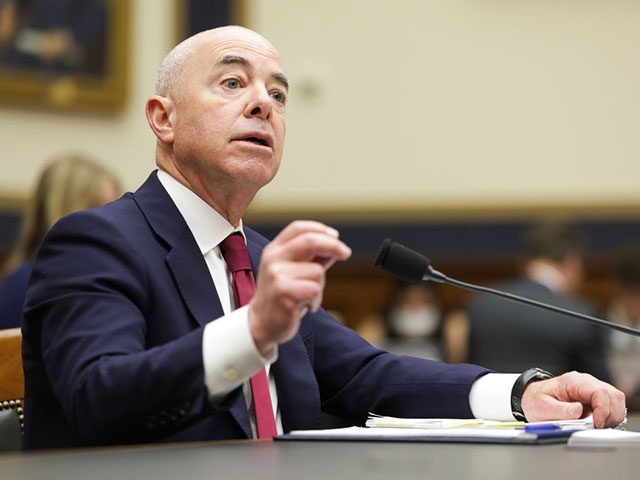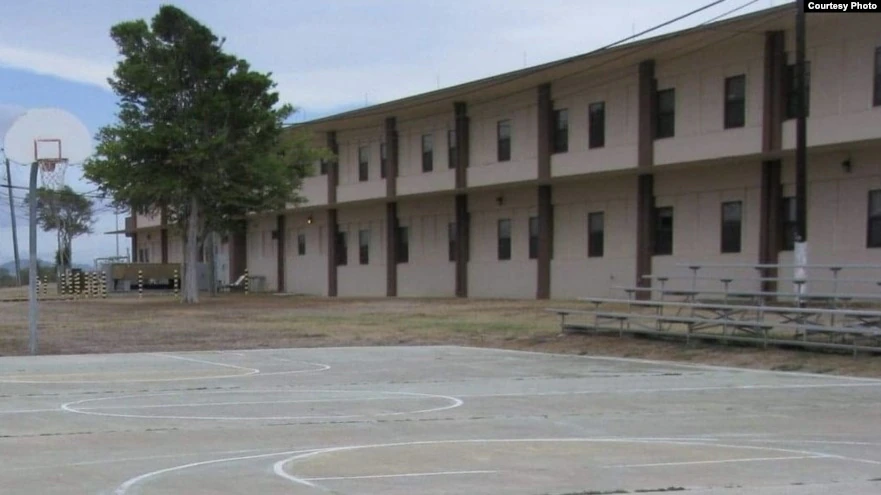President Joe Biden’s border agency has sent a small number of rescued Cuban migrants into a holding center at a U.S. base in Guantanamo Bay, Cuba, according to a U.S. government broadcast network.
“More than 20 Cuban citizens are currently in the Migrant Operations Center, at the Guantánamo Naval Base (MOC), waiting for a third country to grant them refuge,” Radio Television Marti reported. The site added:
The 28 migrants were rescued [at sea] by the Coast Guard and, later, transferred to the Guantánamo Naval Base in boats of the official entity between October 1, 2021 and September 30, 2022.
…
The spokesperson indicated that, after being interviewed, [the border agency] determined that the migrants expressed a well-founded fear of persecution or torture if they were repatriated. He also clarified that foreigners are not detained and can request their return to their respective countries whenever they wish.
The small-scale detention is not intended to stop the massive wave of migrants from moving via Mexico into Americans’ society, jobs, homes, and schools.
Instead, it is a small part of a worldwide migration system that is being built and run by government-funded progressives — not by Congress, cartels, or coyotes.
So far, Biden’s border chief, Alejandro Mayorkas, has allowed at least 2.5 million poor migrants across the southern border, under various legal claims, such as asylum rules or “immigration parole.” That huge inflow has included 280,000 Cubans.
Portions of Mayorkas’ off-the-books migration system have been operating for years. For example, many migrants get U.S. government help as they travel from Colombia to Mexico under a program called “Controlled Flow.”
By subscribing, you agree to our terms of use & privacy policy. You will receive email marketing messages from Breitbart News Network to the email you provide. You may unsubscribe at any time.
Many other economic migrants are simply allowed to enter and work illegally without interference from the federal government. For example, the federal government makes little effort to stop foreign white-collar workers from entering the country on B-1/B-2 tourist visas.
Mayorkas’s pseudo-legal immigration network has no official name, said Rosemary Jenks, the government relations director at NumbersUSA.com. “He is using the pretense that has is doing it legally,” Jenks said, while he insists he is “building a safe, orderly, and humane immigration system.”
Congress allows roughly 1 million legal immigrants each year, plus about 750,000 visa workers.
But officials have not set any limits on the number of economic migrants who will be allowed to use Mayorkas’ backdoors into Americans’ society. “The sky’s the limit in Mayorkas’ mind because he’s an open-borders zealot,” Jenks said.
Mayorkas is a Cuban-born, pro-migration lawyer who rarely uses his legal authority to protect Americans from companies’ use of cheap, imported labor. “We are building an immigration system that is designed to ensure due process, respect human dignity, and promote equity,” Mayorkas tweeted in August 2021, as he sketched out his plans for easy-asylum rules that would encourage a worldwide migration of poor job-seekers, renters, and consumers into Americans’ homeland.
“Equity,” according to progressives, means that foreigners would have the same right to live and work in the United States are ordinary Americans.
Progressive also portray their pipeline as a campaign to protect migrants from the rival cartels and coyotes that now make billions in border taxes on migrants. But the anti-cartel campaign is not trying to stop the migration — it is intended to manage the traffic so there are no visible disasters, mass deaths, or traffic jams that might frighten the public.
For example, a November 16 statement from Mayorkas’ agency said:
We also continue to work with our partners throughout the Western Hemisphere on an anti-smuggler campaign of unprecedented scale that has already resulted in more than 5,500 arrests and nearly 6,000 disruptions of human smuggler infrastructure. Among other actions, we and our partners have raided smuggler stash houses, impounded tractor trailers that are used to smuggle migrants, and confiscated smuggler IT to track down more smugglers. Across the federal government we also continue to work with other countries to address the root causes of irregular migration that are leading to an unprecedented migratory surge and challenging our hemisphere.
These plans are complicated by splits among Biden’s deputies and political allies.
Some officials worry that mass migration might prompt a political rejection by votes — as it did in 2022 — while other officials and progressive advocates ideologically oppose Americans’ right to protect themselves from waves of poor migrants. For example, Mayorkas recently announced he would block Venezuelan migrants at the border — but also promised to parole at least 24,000 Venezuelans into U.S. society.
Mayorkas also welcome the takedown of the Title 42 barrier that allows him to exclude some migrants who claim a need for asylum. But he is now readying to distribute many more poor migrants from the border into Americans’ jobs, homes, and schools. The distribution is being accomplished by a semi-hidden network of buses and reception centers, many funded by taxpayers and corporate donations.
Mayorkas is also offering benefits to Mexico’s government — such as work permits for U.S. jobs — if they block some migrants from reaching U.S. borders.
The Cuban detention at Guantanamo is likely part of a “Lily Pad” migration-management project leaked to NBC in October:
The White House National Security Council is asking the Department of Homeland Security what number of Haitian migrants would require the U.S. to designate a third country, known as a “lily pad,” to hold and process Haitian migrants who are intercepted at sea and what number would overwhelm a lily pad country and require Haitians to be taken to Guantánamo, according to the document.
Donor-backed GOP legislators have largely ignored the government-invited economic migration. Instead, they denounce the non-economic aspects of Mayorkas’ migration — the chaos, drug smuggling, and increased crime.
Extraction Migration
Legislators and government officials try to grow the economy by raising exports, productivity, and the birth rate. But they also want rapid results, so they also extract millions of migrants from poor countries to serve as extra workers, consumers, and renters.
This Extraction Migration policy floods the labor market and so it shifts vast wealth from ordinary people to older investors, coastal billionaires, and Wall Street. This shift cripples many Americans as they try to advance in their careers, get married, raise families, buy homes, or gain wealth.
Extraction Migration also slows innovation and shrinks Americans’ productivity. This happens because migration allows employers to boost stock prices by using stoop labor and disposable workers instead of the skilled American professionals and productivity-boosting technology that earlier allowed Americans and their communities to earn more money.
This migration policy also reduces exports because it minimizes shareholder pressure on C-suite executives to take a career risk by trying to grow exports to poor countries.
Migration undermines employees’ workplace rights, and it widens the regional economic gaps between the Democrats’ cheap-labor coastal states and the Republicans’ heartland and southern states.
An economy fueled by Extraction Migration also drains Americans’ political clout over elites and alienates young people. It radicalizes Americans’ democratic civic culture because it gives a moral excuse for wealthy elites and progressives to ignore despairing Americans at the bottom of society, such as drug addicts.
This diversify-and-rule investor strategy is enthusiastically pushed by progressives. They wish to transform the U.S. from a society governed by European-origin civic culture into an economic empire of jealous identity groups overseen by progressive hall monitors. “We’re trying to become the first multiracial, multi-ethnic superpower in the world,” Silicon Valley Rep. Rohit Khanna (D-CA) told the New York Times in March 2022. “It will be an extraordinary achievement … We will ultimately triumph,” he boasted.
But the progressives’ colonialism-like economic strategy kills many migrants. It exploits the poverty of migrants and splits foreign families as it extracts human resources from poor home countries to serve wealthy U.S. investors.
Progressives hide this Extraction Migration economic policy behind a wide variety of noble-sounding explanations and theatrical border security programs. Progressives claim the U.S. is a “Nation of Immigrants,” that economic migrants are political victims, that migration helps migrants more than Americans, and that the state must renew itself by replacing populations.
Similarly, establishment Republicans, media businesses, and major GOP donors hide the skew towards investors by ignoring the pocketbook impact and by touting border chaos, welfare spending, migrant crime, and drug smuggling.
Many polls show the public wants to welcome some immigration. But the polls also show deep and broad public opposition to labor migration and to the inflow of temporary contract workers into the jobs needed by the families of blue-collar and white-collar Americans.
This “Third Rail” opposition is growing, anti-establishment, multiracial, cross-sex, non-racist, class-based, bipartisan, rational, persistent, and recognizes the solidarity that American citizens owe to one another.


COMMENTS
Please let us know if you're having issues with commenting.